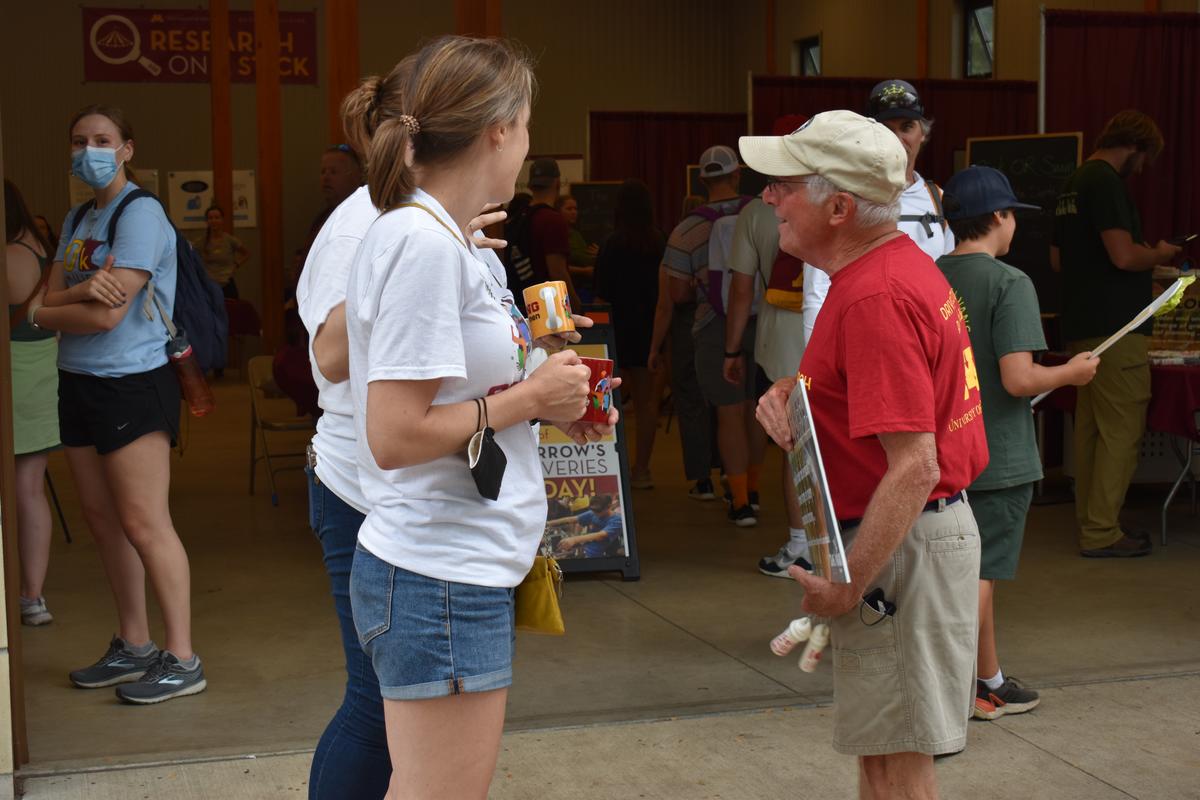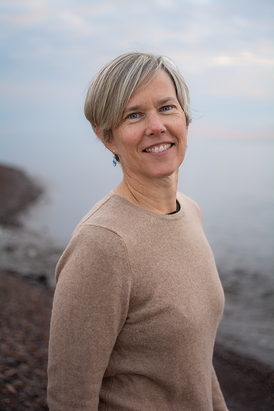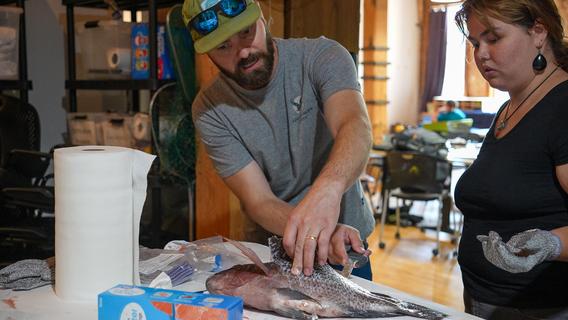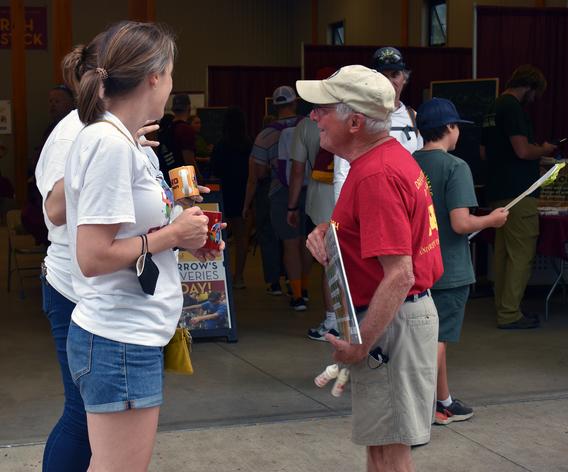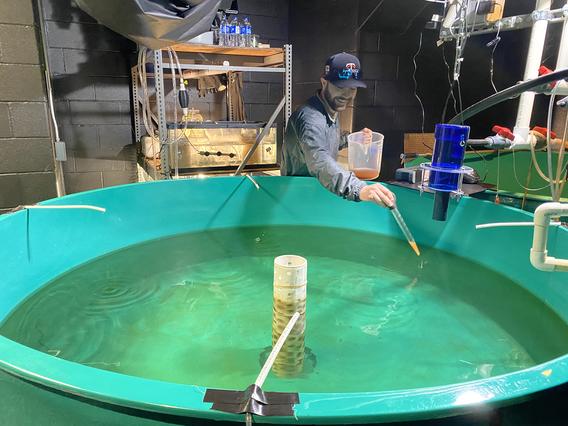Duluth, Minn. — Aquaculture, the practice of cultivating aquatic organisms like fish and shrimp, holds immense potential for sustainable seafood production, but aquaculture in the Great Lakes region has not kept pace with increases in consumer demand for fish and seafood and the region lags behind progress in marine coastal states. Minnesota Sea Grant is working to address that problem.
“Significant challenges to the development of aquaculture in the Great Lakes region include the lack of consumer awareness about what aquaculture is, an absence of social acceptance or social license from some in local communities, and how to successfully grow fish indoors in Minnesota” said Amy Schrank, Minnesota Sea Grant Extension Program Leader and Fisheries and Aquaculture Extension Educator.
Staff from Minnesota Sea Grant Fisheries and Aquaculture Program will be presenting recent and ongoing projects that address these challenges at the 2024 Aquaculture America conference in San Antonio, Texas, February 18-21, 2024.
“Our ultimate goal is to equip consumers with the knowledge needed to make informed decisions at the seafood counter, thereby supporting the growth of a sustainable aquaculture industry,” said Schrank. “A more seafood-literate public empowers consumers to make choices that align with their health and environmental values.”
Several of Minnesota Sea Grant’s ongoing aquaculture-focused projects aimed at engaging youth and adults using age-appropriate, science-based materials and interventions will be presented at the conference.
Aquaculture literacy
A recent MNSG survey distributed to aquaculture extension professionals and others in the aquaculture industry revealed that while consumers may have heard the term aquaculture, most struggle to define or explain it to others. This finding was further emphasized by a survey conducted by MNSG as part of their Aquaculture Market Study at the 2022 Minnesota State Fair’s Driven to Discover Research Facility, where consumers’ responses showed a lack of understanding regarding the source of their seafood.
“Despite this lack of understanding, it was interesting to note that these consumers expressed a willingness to pay extra for local products, which we think emphasized the importance of seafood origin in their choices,” said Schrank.
Kids Cooking Seafood with Spark-Y
MNSG’s 2023 Kids Cooking Seafood with Spark-Y collaboration with Spark-Y, a nonprofit organization in Minneapolis, Minnesota, produced a Cooking Seafood With Spark-Y cookbook, and two demonstration videos How to Filet a Fish with Spark-Y and Cooking Seafood With Spark-Y, a cooking demonstration lesson plan, and a short promotional video all aimed at inspiring kids and families to try seafood preparation at home.
User-friendly Midwest seafood and aquaculture information
MNSG reviewed existing online aquaculture resources and surveyed aquaculture extension professionals and others in the aquaculture industry to identify the information that might help address the lack of awareness about aquaculture in Midwest consumers.
“We are taking the information we collected and developing a Consumer Education on Seafood and Aquaculture webpage to provide curated information for people interested in the aquaculture industry, for consumers of fish and seafood, and for educators interested in using aquaculture concepts in the classroom to teach science, technology, engineering, and math (STEM) topics,” said Schrank.
Another direct-to-consumer product is the MNSG-led FreshFishFinder.org website that connects Great Lakes fisheries and aquaculture producers directly to consumers. The site includes a map, a list of participating producers, and a fish-type search function for consumers to locate the closest fish and seafood producers.
Social license
A better understanding of aquaculture and working toward environmentally responsible, competitive, and sustainable aquaculture methods are key to social acceptance.
“Social acceptance or social license of aquaculture is a challenge,” said Don Schreiner, MNSG fisheries specialist, who will be presenting on social license at the conference. “Social license isn’t anything you can apply for. It’s when a project or practice has the ongoing approval or acceptance within a local community. Our work to directly engage the public in the development or revision of state aquaculture plans and policies is one way we try to build social license.”
The Sea Grant Great Lakes Aquaculture Collaborative (GLAC), led by MNSG, plays an important role in building social license by working with aquaculture producers to provide training, resources, networking opportunities, and consumer education about aquaculture.
“Using aquaculture to provide positive solutions to local issues such as bait shortages, growing fish for stocking, and producing fresh seafood locally are all benefits of aquaculture that most people will support,” said Schreiner.
Raising Yellow Perch from egg to market-size
Many Minnesota fish farmers are looking for a species that has a higher market value than Tilapia and Yellow Perch might fill that niche. MNSG has been actively engaged with Minnesota fish farmers since 2017 and raising Yellow Perch is one of the problems they asked Sea Grant to help them with.
MNSG’s project on producer-scale methods for raising Yellow Perch from egg to market size (project video) seeks to help address the demand for a high-value species among Midwest fish farmers in the Great Lakes region and will be the topic of a presentation by MNSG Aquaculture Extension Associate Kieran Smith.
Upcoming seafood demos and Great Lakes region farm tours
To bring education, social acceptance, and hands-on examples together, Minnesota Sea Grant is planning experiences in 2024 such as filleting and cooking workshops that showcase aquaculture-produced products at state fairs and seafood celebrations and state and regional aquaculture farm tours for legislators.
“We hope these upcoming activities not only demystify aquaculture but also highlight its potential to contribute to local economies,” said Schrank.
Minnesota Sea Grant is a systemwide program of the University of Minnesota and one of 34 federal-university Sea Grant partnerships across the country that bring applied water science to communities. MNSG has staff and offices on the Duluth and St. Paul campuses. Our extension educators, researchers and communicators work with community members, local decision-makers, policy leaders, and personnel from resource agencies, business and industry to enhance the use and conservation of Great Lakes and Minnesota’s inland water resources to create strong and sustainable economies, healthy environments, and resilient and inclusive communities.
ADDITIONAL INFORMATION:
- Minnesota Sea Grant Fisheries and Aquaculture Program
- Consumer Education on Seafood and Aquaculture
- Sea Grant Great Lakes Aquaculture Collaborative
- Kids Cooking Seafood with Spark-Y
- Increasing Golden Shiner Bait Production in Minnesota project
- Sea Grant Great Lakes FreshFishFinder.org
CONTACTS:
- Amy Schrank, extension program leader and fisheries and aquaculture extension educator, Minnesota Sea Grant, University of Minnesota and University of Minnesota Duluth, aschrank@umn.edu
- Don Schreiner, fisheries specialist, Minnesota Sea Grant, University of Minnesota and University of Minnesota Duluth, schr0941@d.umn.edu
- Kieran Smith, aquaculture extension associate, Minnesota Sea Grant, University of Minnesota and University of Minnesota Duluth, smit2013@umn.edu
- Marie Thoms, communications manager, Minnesota Sea Grant, University of Minnesota and University of Minnesota Duluth, methoms@d.umn.edu.
